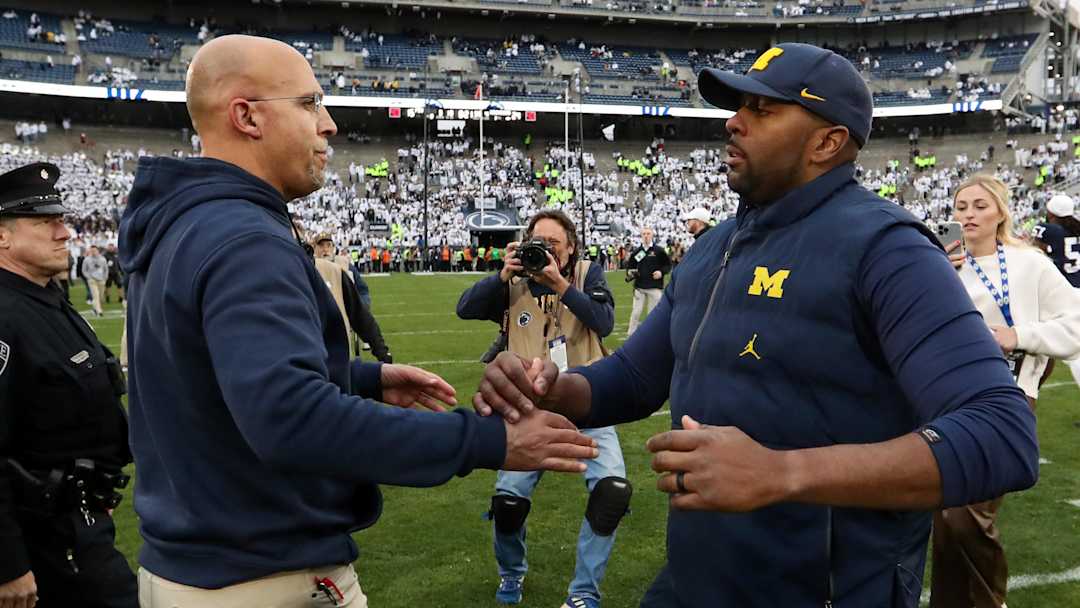“‘QUIT BEGGING’: Ex-Michigan Star Torches James Franklin After Penn State Coach’s Conference Plea Stirs Notre Dame Debate”
At this year’s Big Ten Media Days, the ever-shifting world of college football was front and center, with hot-button issues like NIL deals, the expanded College Football Playoff (CFP), the transfer portal, and realignment dominating conversations. One of the more pointed moments came from Penn State head coach James Franklin, who used his time at the podium to push for greater scheduling uniformity across all programs. He argued that every team should be part of a conference and face an equal number of conference matchups to ensure a level playing field.
Franklin’s comments were delivered in a calm yet firm manner. Without calling out any specific schools directly, he expressed frustration over what he sees as competitive imbalance—particularly in regard to independent programs like Notre Dame. His argument centered on the idea that every program should be under the same structural demands, including playing in a conference and adhering to the same number of in-league games.
During his time with the media, Franklin made it clear he wasn’t going to criticize fellow Big Ten teams for their non-conference scheduling, especially when other conferences are only required to play eight league games instead of the nine mandated in the Big Ten. Instead, he refocused the conversation on what he described as the broader need for fairness and consistency across college football.
Citing schools like Notre Dame as examples, Franklin explained that independence can sometimes provide programs with an easier road to the postseason. Notre Dame, for example, doesn’t participate in a conference championship game—an extra, high-stakes hurdle that most Power 4 programs must overcome to reach the College Football Playoff.
Looking back at Notre Dame’s 2024 schedule, Franklin’s point becomes clearer. The Fighting Irish had high-profile games against Texas A&M, Florida State, and USC—but all three teams finished the season with losing records, combining for a disappointing 17-21 mark. Beyond those games, Notre Dame’s opponents included less competitive programs like Navy, Army, Northern Illinois, and Purdue. Notably, Northern Illinois handed Notre Dame its only regular-season loss, but that didn’t stop the Irish from earning a CFP berth—and ultimately eliminating Penn State in the Semifinal.
Franklin’s comments sparked plenty of debate, as some interpreted his remarks as sour grapes or an attempt to shift attention away from Penn State’s recent shortcomings on the national stage. Last season’s semifinal loss to Notre Dame was a painful one for the Nittany Lions, and critics didn’t hesitate to point that out.
Among those critics was former Michigan standout Jourdan Lewis, who took to social media to voice his disdain for Franklin’s message. In a sharp rebuke, Lewis wrote, “What precedence does this send the team you’re coaching? Quit begging and coach a winning program.” His tweet quickly gained traction, reflecting a sentiment shared by many who believe Franklin should be more focused on results than rules.
Lewis, who played for Michigan during a time when the Wolverines were also trying to crack the CFP code, clearly wasn’t buying Franklin’s argument. Instead, he suggested that success comes from winning tough games, not from lobbying for structural changes. His jab carried extra weight given Michigan’s recent dominance in the Big Ten and consistent presence in playoff conversations.
Despite the backlash, Franklin’s central message—calling for equality in scheduling and conference participation—is one that many within the sport quietly agree with. The current system allows for significant variation in strength of schedule, depending on a team’s conference affiliation or lack thereof. While the CFP committee considers strength of schedule in its evaluations, critics argue that the selection process can still favor schools with easier paths.
Franklin’s proposal, in essence, aims to eliminate these disparities by mandating conference affiliation and standardized scheduling rules. If every team had to play nine conference games and a championship matchup, the selection process would become more apples-to-apples than apples-to-oranges.
Still, Franklin’s detractors argue that winning solves everything. They point to schools like Michigan, Georgia, and Alabama—programs that consistently handle tough schedules and still make deep playoff runs. In that light, some believe Franklin is more interested in changing the system than overcoming its challenges.
Yet the bigger issue remains: the College Football Playoff is supposed to determine the best teams in the country, but as long as programs face vastly different schedules, questions will persist about fairness. And without universal guidelines, independent programs like Notre Dame can continue to tailor schedules that may help them reach the postseason with fewer obstacles.
James Franklin, to his credit, didn’t name-drop Notre Dame or any other program specifically, but his message was unmistakable. He wants reform—ideally, in time for the next wave of CFP expansion and Big Ten realignment. With the sport already undergoing massive changes due to media rights deals and the consolidation of power among elite programs, Franklin believes now is the moment to push for structural consistency.
His critics, like Lewis, believe he should focus less on external factors and more on elevating Penn State to championship contention through wins. But Franklin’s supporters would counter that he’s doing both—trying to win games while also advocating for a more equitable system that doesn’t favor independents or allow certain conferences to bypass tougher schedules.
Ultimately, the question Franklin raises—whether the path to the playoff should be the same for all contenders—won’t be settled by tweets or media day soundbites. It will take a larger conversation among conference commissioners, university presidents, and the CFP committee itself.
Until then, coaches like Franklin will continue to push for reform, while others like Lewis will urge them to simply win. Whether you agree with Franklin or not, his comments reignited a crucial debate about fairness, structure, and what it truly means to be one of the best teams in college football. And with another season on the horizon, those questions won’t be going away anytime soon.



